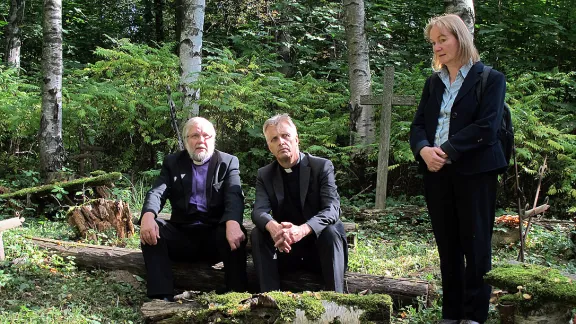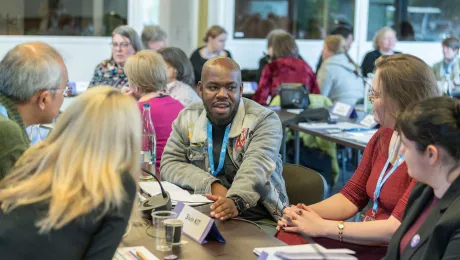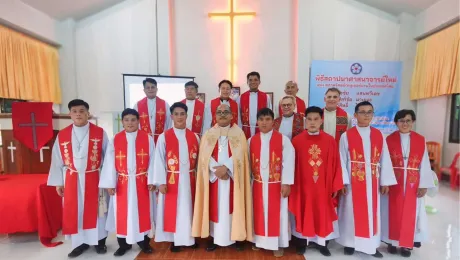
Visiting Keltto cemetery near St Petersburg: (left to right) ELCIR Bishop Arri Kugappi, LWF General Secretary Rev. Martin Junge and Europe Area Secretary Rev. Dr Eva Sibylle Vogel-Mfato at Keltto cemetery, a safe worship space for Ingrian Christians during Communist rule. Photo: Pekka Mikkola/FELM
Junge’s Russia Visit Focuses on Mission of Church Today
(LWI) - The General Secretary of The Lutheran World Federation (LWF) Rev. Martin Junge has cautioned that the Church must not turn away from the world as it faces the fast-changing complex realities of the 21st century.
Speaking on the opening day of the General Synod of the Evangelical Lutheran Church in Russia (ELKR), 16-19 September, near St Petersburg, he urged delegates not to merely focus on the survival of the Church.
“In Jesus Christ it is clear that God has set out to meet people where they are, in their daily life contexts, with their joys and sorrows and contradictions, dependence on love and forgiveness, hope and peace,” Junge told ELKR clergy and lay members meeting at the Theological Seminary in Nowosaratowka.
The Church can have no other purpose than to participate in God’s mission of love and caring for the world. Therefore the Church is not an end unto itself that should focus on its own security, he cautioned.
“How is it that the Church wants to turn away from the world over and over again? If God so loved the world, where does this often so deep contempt and aversion for the world come from that we see in church votes and attitudes?”
A Church that participates in the mission of God cannot turn its back on the complexities of today but must stand up to them as an expression of God’s merciful, forgiving love, Junge said.
The general secretary noted that God’s mission, revealed in Jesus Christ, is to the whole person, whether alienated from self because of sin, marginalized because of origin, lifestyle or gender, suffering from hunger or disease.
“It is about providing a life in abundance, comprehensive reconciliation, justice and peace,” Junge emphasized.
“Not every church can afford immense diaconal institutions and projects, and also not every church can offer a response to sometimes very complex social problems. Yet they should not underestimate how much they can do when it comes to loving their neighbor,” Junge added.
Reconciliation and the 500th Reformation Anniversary
The LWF General Secretary also met with leaders of the Evangelical Lutheran Church of Ingria in Russia (ELCIR) in St Petersburg, participated in devotions at St Mary’s Cathedral, and visited the graveyard at Keltto, where Christians secretly met during the Soviet era.
The 500th anniversary of the Reformation in 2017 was the main focus of discussions during Junge’s meetings with ELCIR Bishop Arri Kugappi, and the ELKR leaders Archbishop Dietrich Brauer and Bishop Otto Schaude, as well as the governor of St Petersburg Georgij Poltawtschenko.
Junge stressed LWF’s commitment to reconciliation among people and among churches, and that the anniversary celebrations will not focus on “divergences as discussed 500 years ago” but on what Reformation means today. The Lutheran churches, he added, strive to be bridge builders instead of becoming stumbling blocks.
Church Rebirth
Outlining ELKR’s preparations for 2017, Brauer said the plans include renovation of the cross on the Petri Church as a symbol of the church’s rebirth following years of repression, the building of a new organ at the church and the publication of a book about a Lutheran pastor’s daughter. He also thanked the governor for support in building a square where St Mary’s Church (Marienkirche) once stood, as a memorial to people’s sacrifice and survival during the city’s siege in the Second World War.
“Through these educational components, the Reformation anniversary shall become our internal celebration, connecting to our own church context,” he said. The archbishop also noted the growing relations with the Roman Catholics, which he said the Lutherans want to strengthen.
Bishop Kugappi spoke of plans to renovate St Anne’s church, with potential support from the city as part of the ongoing collaboration in social endeavors. “In our engagement for suffering people, we came to know each other better, especially in our plans to build two homes for the elderly,” he said.
Cornerstones of Human Values
Governor Poltawtschenko said the city’s foundation was closely connected with the establishment of several confessions and currently supports the over 400 congregations in St Petersburg. Many “people of Lutheran faith have worked here, in science and other occupations in public responsibility, [which is] important for the city, [and] the Lutheran parishes are well known and active in educational and humanitarian work,” he said.
Responding to a request about the city’s collaboration with the Lutheran churches in marking the Reformation anniversary together with other churches in the city, the governor expressed his support, adding that “the churches today should become cornerstones of human values and nourish human beings against their interior struggles.” He emphasized further support in conservation of other church buildings.


